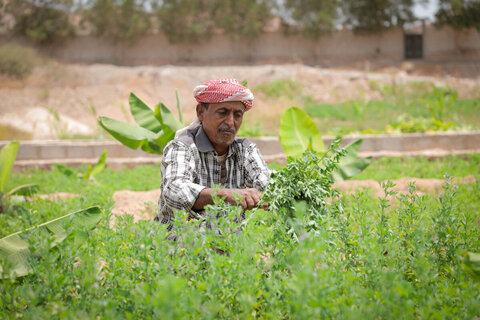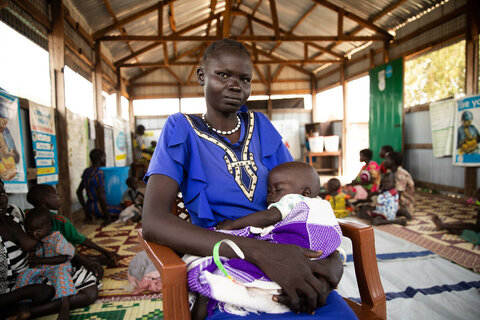World Food Programme: ‘The needs in Syria have never been greater’

Behind nine years of news reports on tragedies in Syria are families who've lost those closest to them, been forced to flee, and who've seen their homes and livelihoods destroyed.
Rania's family lived under siege for three years when Isis took control of Deir Ez-Zor. They did not have electricity during most of this time in a city where summer temperatures can exceed 50 °C. She is 25 years old, and conflict and food insecurity play a huge part in her life.
"During the siege, it was a struggle to survive," she says. "I have four children, and today is the first time I have collected food from the World Food Programme. This will make a huge difference to my family. My husband doesn't work, and we don't have any form of income. I can't buy any food for my children."

Food from the World Food Programme (WFP) is now a lifeline for 4.8 million people in Syria. For many, it's the only food they eat each month.
Basic foods such as rice and wheat are now expensive for everyone, but it's vulnerable families like Rania's which have the most to lose. "When I do have money, I wait until prices are lower, I can't afford to buy when they are high," she says. "People here help each other to survive, we don't have any other choice."
Then she makes a heart-breaking plea: "Please help me to feed my children."

"Syrian families now face more than they can handle," says Corinne Fleischer, WFP's Country Director in Syria. "The situation has gone from bad to worse."
"Food prices are the highest they have ever been since the start of the crisis in 2011. People tell us they can't afford to buy food, they have to wait until prices go down. They are not waiting to buy a new television, they are waiting to buy food."

Indeed, prices are the highest they've ever been, having increased by a staggering 209 percent in the past year alone. Even basic foods are becoming beyond the reach of many.
Conflict continues as the economic crisis in neighbouring Lebanon puts additional pressure on Syrian families; shops have closed, families have lost their only source of income and a global pandemic has struck. Together, these factors are creating a downward spiral that will push even more Syrian families into hunger and poverty.
An estimated 9.3 million Syrians are now food-insecure — an increase of 1.4 million in just six months.

Muhammad opened his store in Deir Ez-Zor before the conflict began. "Things now are worse than ever, because people don't have the money to buy," he says. "It's getting worse year by year. Before, people might buy several items, but now they'll just choose the essentials. The rise in prices doesn't have a positive effect on my business, I'm losing money and paying double what I used to."
"People are buying what is available, and they don't have many choices now." Retailers are struggling to restock their products while prices are fluctuating so greatly — they are now 20 times higher than they were before the conflict, and this has had a huge impact on the food that families can buy. Many have been forced to adapt. "People are buying lower quality foods and we don't usually see this happening," says Muhammad.

"Families in Syria have almost nothing left," says Fleischer. "They have exhausted their savings, they have survived a humanitarian crisis and now they are pulling their children out of school because they can't afford to send them there.
"They are closing their businesses because they can't afford to buy new stock. They are eating less and selling their assets to survive. It will take families years to recover from these losses. The levels of hunger are unprecedented, even during the worst years of the conflict."
Fleischer adds: "Syrians want to rebuild their lives, to grow their own food and start their businesses. Lifesaving food from WFP is critical to help families to meet their needs, fight hunger and know that they can cook a warm meal at the end of the day. WFP is grateful for the ongoing support of our donors, who have made our lifesaving work in Syria possible."
Millions dream that one day the Syria they love and remember will be restored. These families need help more now than ever to make that possible.


